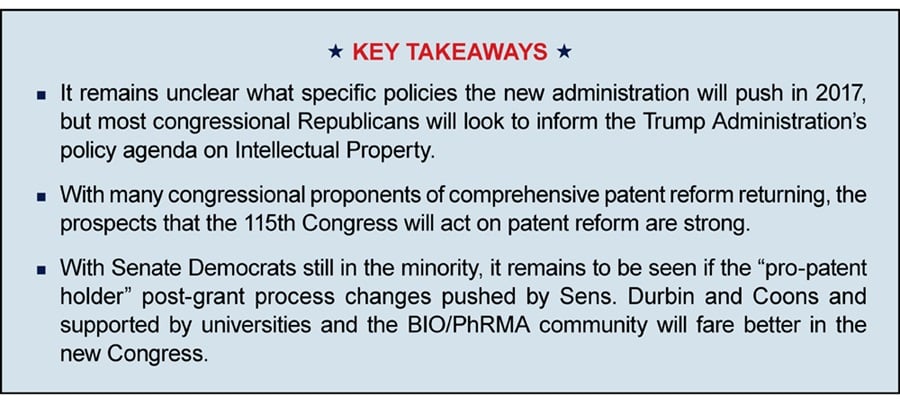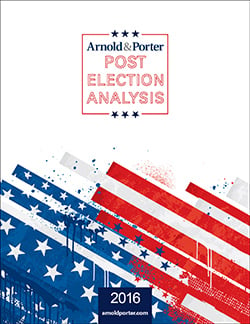Post-Election Analysis 2016: Intellectual Property

ADMINISTRATION PRIORITIES
During the campaign, President-elect Trump released a policy statement on protecting American intellectual property (IP) holders from Chinese piracy in the broader context of reforming US trade policies with China. Details about proposed reforms were not discussed, but President-elect Trump opposes the Chinese government requiring US companies to transfer technology to Chinese companies before entering the country's market. Given President-elect Trump's protectionist statements on trade and foreign policy, including his opposition to the Trans-Pacific Partnership, it is reasonable to presume his policies on intellectual property also will focus on strengthening protections for US companies. It remains unclear what specific policies the new administration will push in 2017, but most congressional Republicans will likely seek to educate the Trump Administration's IP policy agenda.
AGENCY LEADERSHIP
Neither President-elect Trump nor anyone on his transition team has signaled who might assume cabinet level or under-secretary level positions at the Department of Commerce.
CONGRESSIONAL LEADERSHIP
House. On the House side, Republicans retained their majority and shake-ups in leadership are not expected. Rep. Bob Goodlatte (R-VA) will continue to chair the House Judiciary Committee and Rep. John Conyers (D-MI) will continue as ranking member. Rep. Darrell Issa (R-CA), a strong proponent of patent reform, is expected to continue chairing the Subcommittee on Courts, Intellectual Property and the Internet, while Rep. Jerry Nadler (D-NY) should continue as the subcommittee's ranking member. Overall, the congressional players on potential patent reform legislation in the 115th session of Congress will likely remain the same as those in this session.
Senate. Sen. Chuck Grassley (R-IA) will continue to chair the Senate Judiciary Committee and Sen. Pat Leahy (D-VT) will remain ranking member. Sens. Grassley and Leahy co-authored bipartisan legislation (S.1137, the PATENT Act) with Sen. John Cornyn who also is on the committee and currently Majority Whip.
CONGRESSIONAL PRIORITIES
During the 114th Congress, there was a bipartisan effort to introduce comprehensive patent reform legislation in both the House (H.R. 9, the Innovation Act) and Senate (S.1137, the PATENT Act) that contained many provisions widely supported in Congress and by the Obama Administration. Both bills aimed to curb abusive practices in patent litigation through provisions including heightened pleadings requirements, fee-shifting, limits on discovery, stays of customer suits, and better disclosure of real party-in-interest information. The Senate's PATENT Act also contained a popular provision aimed at abusive demand letters in patent litigation. The provision was amended in committee to change the post-grant process before the Patent Trial and Appeal Board (PTAB) and require the Board to construe claims under the same standard used in district court. This would have done away with the "broadest reasonable interpretation" standard long used by the Patent and Trademark Office (PTO) in an attempt to make the bill more palatable to the patent holders' side. The provision, however, was opposed by many in the technology community and by those in the BIO/PHRMA sector who lobbied intensely for a carve-out from the PTAB changes.
The PTAB changes also were included in a Democratic bill (S.632, the STRONG Patents Act) along with other provisions seen as balancing the process at the PTAB towards the interests of patent holders. That bill, authored by Sens. Dick Durbin (D-IL) and Chris Coons (D-DE), was supported by the higher education community and BIO/PhRMA, but did not have the same level of broad bipartisan support as the PATENT Act.
With many of the patent reform proponents returning to Congress, the prospects that the 115th Congress will act on patent reform are strong. On the campaign trail, President-elect Trump did not detail his positions on the reform bills that moved in this Congress, meaning that Republican congressional leaders will look to inform the administration on patent reform to build on the momentum of 2015 and restart negotiations. With Senate Democrats still in the minority, it remains to be seen if the "pro-patent holder" post-grant process changes, pushed by Sens. Durbin and Coons and supported by universities and the BIO/PhRMA community, will fare better in the new Congress or again be the cause for derailing the bill.
Our full analysis of the 2016 election is available below.


